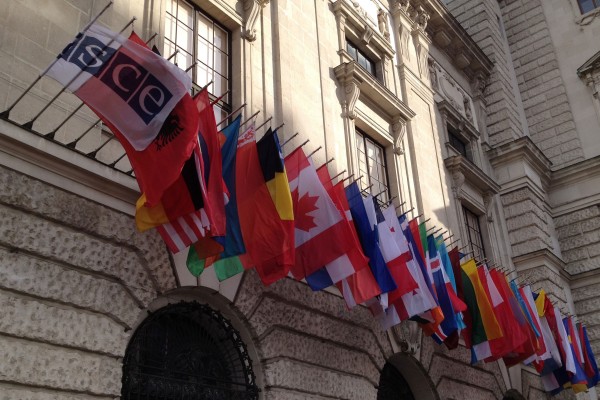Ukraine Wants to Boycott OSCE-Meeting Because of Russian Delegation
The Organization for Security and Cooperation in Europe (OSCE) is not going through its best times. Especially Austria’s role in it. After many countries sent an open letter to Austria to disinvite the Russian delegation from the Parliamentary Assembly, countries are now boycotting the meeting.
 Countries are Boycotting the OSCE Parliamentary Assembly Because of the Attendance of the Russian Delegation. / Picture: © Vindobona.org
Countries are Boycotting the OSCE Parliamentary Assembly Because of the Attendance of the Russian Delegation. / Picture: © Vindobona.org
At the meeting of the OSCE Parliamentary Assembly scheduled for next week, the EU and NATO member states are threatened with a divided approach. Some are considering staying away from the event in Vienna because Russian delegates are also allowed to come and speak there, on the anniversary of Russia's invasion of Ukraine. The Lithuanian representatives have already announced this after the Ukrainian parliamentarians had initially canceled. Others argue that the field should not be left to the Russians there. The incumbent Swedish President of the Parliamentary Assembly, Margareta Cederfelt, explained that she did not want to cancel or adjourn the conference, according to FAZ.
As reported by Euractiv, in a letter to OSCE Parliamentary Assembly President Margareta Cederfelt, Ukrainian delegation leader Mykyta Poturayev explained the country's decision to boycott the Assembly. Since the Russian delegation will be present, Ukraine will not be able to participate, Poturayev explained. He proposed a postponement of the meeting without naming anyone and he hinted that other members would support it. He believes that the Russian delegation will use the event to justify aggression against Ukraine and whitewash war crimes against Ukrainians.
According to FAZ, because of the date and because registered Duma deputies are on sanctions lists as supporters of the Russian war, it is now attracting attention. The Austrian government has stated that it has to give the Russian participants an entry permit for the event because this is legally binding in the treaties for Vienna as the seat of the OSCE. This is expressly allowed as an exception in the EU sanctions decisions.
For the past 18 months, Russia has been causing problems in the OSCE by not giving its approval to critical matters, including budgets and mandates. As a result, operational and chairmanship uncertainty has occurred within the organization due to an administrative deadlock. Any attempt to disallow Russia from attending the OSCE would have to involve postponements or the refusal to issue visas. The OSCE does not have a mechanism for removing or prohibiting members from participating, according to Euractiv.



